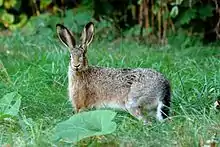hare
English

Pronunciation
- (Received Pronunciation)
- IPA(key): /hɛə/, /hɛː/
- (General American)
- IPA(key): /hɛɚ/
Audio (US) (file) - Homophone: hair
Etymology 1
From Middle English hare, from Old English hara (“hare”), from Proto-West Germanic *hasō ~ *haʀ-, from Proto-Germanic *hasô, from *haswaz (“grey”), from Proto-Indo-European *ḱh₂s-én-.
Noun
hare (plural hares)
- Any of several plant-eating animals of the family Leporidae, especially of the genus Lepus, similar to a rabbit, but larger and with longer ears.
- The player in a paperchase, or hare and hounds game, who leaves a trail of paper to be followed.
Derived terms
- Arctic hare
- arctic hare (Lepus arcticus)
- Belgian hare
- brown hare (Lepus europaeus)
- chief hare
- desert hare
- European hare (Lepus europaeus)
- first catch your hare
- hare and hounds
- hare kangaroo
- hare lip
- hare moon
- hare scramble
- hare-brained
- hare-hearted
- hare-skin
- hare-wallaby
- harebell (Campanula rotundifolia)
- harebrained
- hold with the hare and run with the hounds
- jack-hare
- mad as a March hare
- Manchurian hare
- March hare
- mountain hare (Lepus timidus etc.)
- Patagonian hare (Dolichotis patagonum)
- run with the hare and hunt with the hounds
- scrub hare
- sea hare (Aplysiamorpha or Anaspidea)
- snowshoe hare (Lepus americanus)
- springhare (Pedetes capensis)
- start a fresh hare
- start a hare
- start a hare running
- varying hare
- whistling hare
- you can't run with the hare and hunt with the hounds
Descendants
- Sranan Tongo: hei
Translations
|
Verb
hare (third-person singular simple present hares, present participle haring, simple past and past participle hared)
- (intransitive) To move swiftly.
See also
- form (hare's home)
- leveret (young hare)
- jackrabbit (type of hare)
Etymology 2
From Middle English harren, harien (“to drag by force, ill-treat”), of uncertain origin. Compare harry, harass.
Alternative forms
Verb
hare (third-person singular simple present hares, present participle haring, simple past and past participle hared)
- (obsolete) To excite; to tease, or worry; to harry.
- 1693, John Locke, Some Thoughts Concerning Education:
- To hare and rate them thus at every turn, is not to teach them, but to vex, and torment them to no purpoſe.
-
Etymology 3
From Middle English hore, from Old English hār (“hoar, hoary, grey, old”), from Proto-Germanic *hairaz (“grey”). Cognate with German hehr (“noble, sublime”).
Alternative forms
Adjective
hare
References
Afrikaans
Pronunciation
Audio (file)
Pronoun
hare
- hers (that or those of her)
- Sy het my hemp aangehad en ek hare.
- She wore my shirt and I wore hers.
Danish
Pronunciation
- IPA(key): /haːrə/, [ˈhɑːɑ]
Inflection
See also
 hare on the Danish Wikipedia.Wikipedia da
hare on the Danish Wikipedia.Wikipedia da
Dutch
Etymology
From Middle Dutch hare. This etymology is incomplete. You can help Wiktionary by elaborating on the origins of this term.
Pronunciation
- IPA(key): /ˈɦaː.rə/
Audio (file) - Hyphenation: ha‧re
- Rhymes: -aːrə
Derived terms
Middle Dutch
Determiner
hāre
- inflection of hāer:
- feminine nominative/accusative singular
- nominative/accusative plural
Middle English
Etymology 5
From Old English hara; some forms have the vowel of Old Norse heri.
Pronunciation
- IPA(key): /ˈhaːr(ə)/
Noun
hare (plural hares)
- A hare or its meat (lagomorph of the genus Lepus)
- (rare) An individual who is easily scared or frightened.
- (rare) A hare's skin or hide.
References
- “hāre, n.”, in MED Online, Ann Arbor, Mich.: University of Michigan, 2007, retrieved 2018-06-26.
Norwegian Bokmål
Etymology
From Old Norse *heri, from Proto-Germanic *háswa-. Compare with German Hase, Swedish hare.
References
- “hare” in The Bokmål Dictionary.
Norwegian Nynorsk
Alternative forms
- hårrå (dialectal)
Etymology
From Old Norse *heri, from Proto-Germanic *háswa-. Akin to English hare.
Pronunciation
- IPA(key): /²hɑːrə/
- Homophone: harde
Noun
hare m (definite singular haren, indefinite plural harar, definite plural harane)
- a mountain hare, Lepus timidus
- a hare, a small animal of the genus Lepus
Synonyms
Derived terms
- harepest
- harerug
- trollhare
References
- “hare” in The Nynorsk Dictionary.
Pali
Alternative forms
- 𑀳𑀭𑁂 (Brahmi script)
- हरे (Devanagari script)
- হরে (Bengali script)
- හරෙ (Sinhalese script)
- ဟရေ or ႁရေ (Burmese script)
- หเร or หะเร (Thai script)
- ᩉᩁᩮ (Tai Tham script)
- ຫເຣ or ຫະເຣ (Lao script)
- ហរេ (Khmer script)
- 𑄦𑄢𑄬 (Chakma script)
Rapa Nui

Pronunciation
- IPA(key): /ˈha.ɾe/
- Hyphenation: ha‧re
Derived terms
References
- Veronica Du Feu (1996) Rapanui (Descriptive Grammars), Routledge, →ISBN, page 16
- “hare”, in Diccionario etimológico Rapanui-Español, Valparaíso: Comisión para la Estructuración de la Lengua Rapanui, 2000, →ISBN
- Paulus Kieviet (2017) A grammar of Rapa Nui, Berlin: Language Science Press, →ISBN, page 32
Swedish
Etymology
From Old Swedish hari, hæri, from Old Norse *hari, heri, from Proto-Germanic *hasô.
Pronunciation
audio (file)
Declension
| Declension of hare | ||||
|---|---|---|---|---|
| Singular | Plural | |||
| Indefinite | Definite | Indefinite | Definite | |
| Nominative | hare | haren | harar | hararna |
| Genitive | hares | harens | harars | hararnas |
Derived terms
- harmynt (“harelipped”)
References
Anagrams
Tetum
Etymology
From *pare, from Proto-Malayo-Polynesian *pajay. Compare Javanese pari.